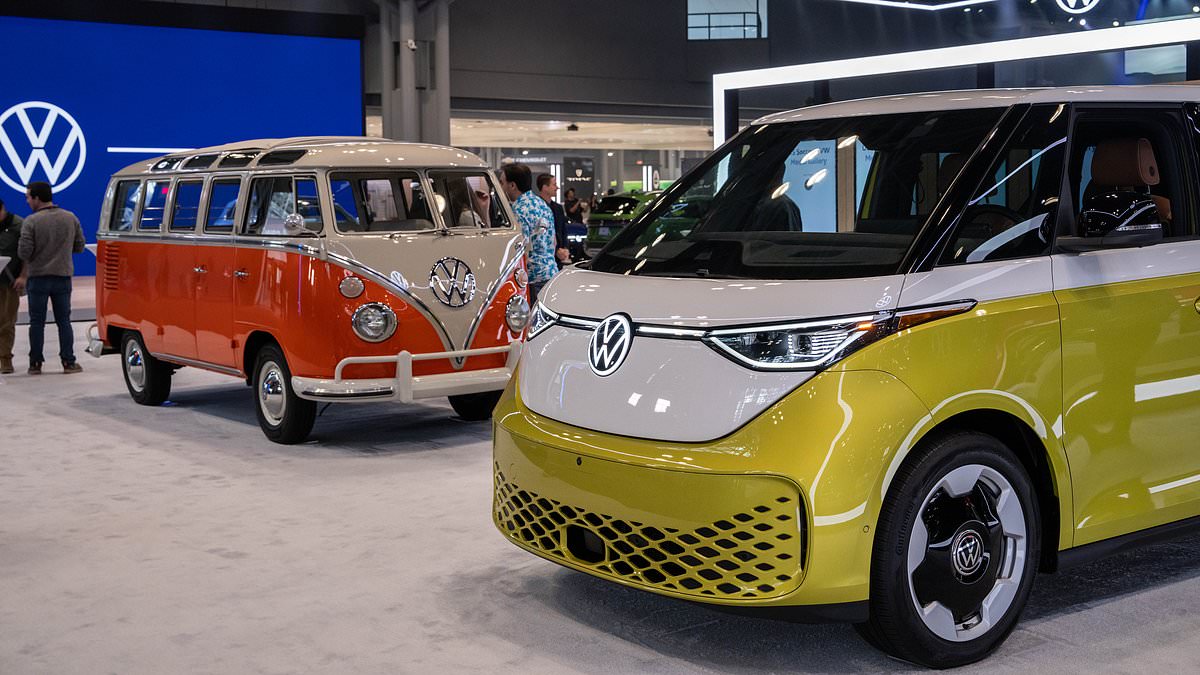Hundreds of shiny new cars are on display at this week’s New York International Auto Show (NYIAS).
Each vehicle is a perfectly polished preview of what’s coming next to America’s dealerships: past NYIAS shows are historically a proud moment for international automakers.
The stages are often the first time media members and the public will see physical models that engineers have teased only as computer-generated images for years.
But this year, the number everyone wants is missing: the prices.
Behind closed doors, automakers are pointing their finger at the White House for creating an increasingly unpredictable policy landscape.
And because of the policies, they don’t even know what their current or upcoming vehicles will even cost.
President Donald Trump’s sweeping tariffs on cars and their parts — ranging from 10 to 25 percent, depending on the component — have complicated pricing strategies.
‘It’s too early to talk about pricing,’ an American CEO, granted anonymity to speak freely, told DailyMail.com.

Industry experts and media members had early access to the NYIAS on Wednesday, where brands touted vehicles like the VW ID. Buzz
‘There isn’t enough clarity [about tariffs] to know what we can ask our customers to pay.’
Before this week, President Trump had been steadfast about the tariffs that impacted the automotive industry the most.
In February, the President launched 25 percent tariffs on imported steel. The levy, which greatly impacted metal-needy carmakers, remained as Trump waffled on other tariffs for Mexico and Canada.
Then, the President singled out the auto industry, launching 25 percent import taxes on all vehicles made abroad.
But he appears to have reconsidered his position.
In comments to the press corps on Monday, Trump said he was considering modifying the auto levy because automakers ‘need a little bit of time.’
Industry analysts at NYIAS repeated what consumer advocates have consistently told DailyMail.com. Tariffs are a massive cost for automakers, and companies will rise car prices and insurance premiums in response.
‘The prices are going to go up,’ John Bozzella, the president and CEO of the Alliance for Automotive Innovation, said during a conference at the show.

NYIAS runs through April 27 at the Javits Center in New York City

Multiple new models, including the Genesis X Gran Equator Concept, were seen in-person for the first time at the show

Subaru’s CEO, Atsushi Osaki, said the company was committed to the US market

Kia launched the K4 hatchback in a brand new yellow paint – the company revealed the popular K4 sedan at NYIAS in 2024
Read More
Cadillac kills off giant gas-guzzling SUV as General Motors makes way for EVs

‘And sales are likely to go down during an adjustment period.’
In the meantime, automakers are experimenting with stopgap strategies to weather the tariff storm — if it holds.
Ford and Stellantis (the parent company that produces Dodge, Jeep, Ram, and Chrysler vehicles) have rolled out employee discount pricing for everyday buyers.
Ford hasn’t released sales figures yet, but executives say the tactic is pulling new shoppers into showrooms.
General Motors is boosting production of its American-made pickups.
And Volkswagen previously told DailyMail.com that it plans to itemize any added tariff costs directly on vehicle stickers, alongside existing fees and optional features.
Other car companies that are more exposed to tariff costs, like Subaru, are emphasizing their current US manufacturing footprint.
‘We are dedicated to offering our American customers a wide range of options to meet their evolving needs,’ Subaru’s CEO, Atsushi Osaki, said before unveiling a new SUV and two redesigns.
During a press conference that might have felt boilerplate in any other year. But the company only has one US factory that produces around 300,000 cars each year.
Subaru sold more than 650,000 cars in the US in 2024.
But despite the patriotic messaging from multiple car companies, no major automaker has announced plans to build new final assembly plants in response to Trump’s tariffs.
Only Hyundai has announced a major US investment of $21 billion — but it was a repackaged 2022 announcement to help facilitate its Georgia EV production plant.
‘We want to build more cars and trucks here in America, and we want to build more cutting-edge components that go into those cars and trucks’ Bozzella said.
‘Here’s the challenge: this is a massive industry that’s incredibly complex.
‘If you’ve ever been to a plant, it’s one of the biggest buildings you’ll ever walk into with billions of dollars of machinery and equipment. You cannot move this overnight.’
